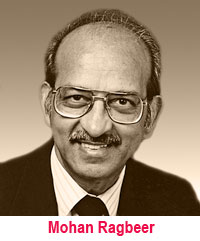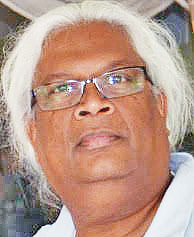Opinions
100 troubled days

Indians (population 250M), are said to have been taken to European colonial plantations, 1,194,957 to British ones; of these 543,218 were transported to Caribbean colonies and Guiana.North American laws allowed few Indians to immigrate there before 1965, and even so, the requirements ensured that only middle class professional and business classes were approved. These have tended to remain aloof from the older diasporal South Asians, who came to North America in a second or third migration, fleeing the racial dictatorships that replaced colonial governments. The total diasporal population in 2012 was estimated as 22M and probably nearer 25M, with about 2M in Canada. The social separation of the two large groups remains an embarrassment for People of Indian Origin (PIO), those from India tending to know less of their history and major religion, apart from certain missions, and find it difficult to relate with the older diaspora, for a variety of reasons, mostly religious.
On Saturday May 6th, the Toronto Arya Samaj observed the centenary of the end of indenture, and celebrated Heritage, with city officials, including the deputy mayor, attending. The heavy recent rainfall put a damper on attendance even though the skies were friendly. A variety of exhibits included some creditable pictorial essays of indenture facts and features by young members, and the usual tasty food was available at nominal cost. I was privileged to introduce my book, India, Under Siege, The Enemy Within; the Deputy Mayor asking who. I summarised the non-terrorist threats, internal but externally funded, especially the persistence in India’s history curricula of Frederick Müller’s mythical Aryan invasion origin of Vaidas, to support Macaulay’s plan to educate Indians to reject their own scriptures. Müller is still revered among Indian intellectuals, despite his fraud. India must correct this, and the stridency of Hinduphobia and cries of Hindutva that greet attempts at correction, financed with mega-bucks by semi-literate American “Sanskritists,” and their Indian acolytes, who ignore the mounting archaeological evidences supporting the Vaidas that could vitalise the nation. I have given facts and comments in the book.
Indian workers were cruelly and inhumanely treated, yet gave good service to fatten British aristocrats, and supplement the largesse that they were stealing from India in countless shiploads, including whole industries, like textiles, and what they couldn’t remove, the human skills, they reduced to penury and starvation by taxing them out of existence. Thus millions of small self-sufficient operators lost land, trades and businesses, while the ruling class and large businessmen were placated after conquest by cannon, graft and bribery. It was this desperate impoverished mass of the most vulnerable that British agents enticed by offering a distant cornucopia of nectar and plenty, and took them to bondage instead, a world of chains, neo-slavery and disease. Those who survived the awful treatment by their employers either returned home or stayed and developed permanent settlements. In The Indelible Red Stain, I described some of the reasons for these options, and in India devoted a chapter to the Diaspora. You must read them to get the ramifications of the old Macaulay plot and the malicious Joshua project, its modern equivalent.
The centenary coincided with other centenaries: the birth year of the late Cheddi Jagan and JF Kennedy; the US Asiatic Barred Zone Act.; US entry into WWI; Canadian victory at Vimy Ridge; the Halifax explosion; the triumphs of Billy Bishop in aerial combat; the overthrow of the aristocracy and the establishment of Marxism in Russia; the miracle of the sun in Fatima; the great influenza pandemic; Einstein’s first paper on relativity; and the notorious Balfour declaration: "His Majesty's government view with favour the establishment in Palestine of a national home for the Jewish people,”…without “prejudice (to) the civil and religious rights of existing non-Jewish communities in Palestine,…" sent to Baron Walter Rothschild, financier and a major leader of British Jews, that has led to the world in turmoil today.
Always a dreamer in a pack of boys
 Romeo Kaseram
Romeo Kaseram
Sometimes we heard an aircraft flying low. Then one among us shouted, causing us to look up from our marbles, our eyes up to that moment glued to the uneven terra firma paths cut into the dry dust in which our taws and aggies rolled against the bias. We quickly lifted our collective gazes upwards just as the aircraft rumbled overhead with a huge belch, its stone grey underside rotund like the belly of an overfed bee, wings spread out so all of it was working at once to keep it clumsily afloat. The aircraft was flying so low its rows of glass windows were close enough for us to see through its opaqueness, and so to make out the
silhouette of a head leaning forward to gaze down with equal curiosity at the bare feet of us ant-like mortals, we knowing those scrutinising eyes were taking in eyefuls of the yellow dirt below the soles of our feet and the many cat’s eyes and black-eyes that were our marbles strewn in the tropical dust, the way constellations appear to be cast randomly in the endless stardust that is the Milky Way.
“Look! The belly of the airplane is going to touch the carat-palm trees on top of the hill!” Such was our youthfulness we thought we could outfly the airplane, the wings of our feet lifting us into the wind as we gave chase. We did so without thinking, abandoning the game at our feet, which moments before had pitted one boy against another, a line drawn in the sand, and shoulder to shoulder, with the heated proclamation, “We will see if your father is stronger than my father!” in a shoving match that saw deep purchase being sought with soles bared, toes grasping mightily into the dust like fingers, eyes set with do-or-die obstinacy, lips pursed and grim with grit.
We ran like gazelles, lifting our feet effortlessly over the detritus of fallen leaves and chicken droppings being heaved forward as a pile by sisters dutifully bent down from the waist, sweeping the ground with long oar-strokes using the over-size whisks of coconut palm brooms.
Our sisters looked up, startled by our whoops and disappearing backs, briefly following our upward gaze to see the receding tail of the aircraft, listening for a moment to the whining of its engines, before bending back again to sweep noisily, and to dream of a better life in a faraway house where the chores were not numerous and onerous, and where there was no round-the-clock enslavement in caregiving for broods of demanding, younger siblings. The neighbourhood dogs, lazing in the siesta of a mid-morning nap following nocturnal duty, neither batted grimy eyes, nor lifted somnolent heads heavy with sleep.
We kept our eyes on the giant fronds of the carat-palm leaves, watching for the tips of its fingers to reach up and touch the underbelly of the airplane. All the fronds did was wave, as if these were fingers on a hand that was gesturing in farewell to the aircraft and the people inside gazing at us from behind thick, protective glass windows.
However, there is always a dreamer in a pack of boys. One among us always disputed the collective evidence gathered in the haste of the chase, causing us to stop in our tracks as we caught our breaths. The less we breathed through our mouths, the more we began to doubt the distance between the underbelly and the tip of the tallest palm-frond as the aircraft flew overhead.
“I tell you it is true. The tallest leaf touched the belly of the beast. I saw it with my own two eyes!”
“No, that is not what happened. The airplane flew miles overhead. It did not even cast a shadow or rustle the tallest leaf!”
So it came once more to the pitting of a father’s gene for physical strength against another.
“My father could beat your father with two hands tied behind his back!”
“Prove it! If I lose, you will be right.”
Another line was drawn in the sand. Yet again both young men heaved, shoulder against shoulder with the ferocity of musk oxen butting heads. What was at stake here was not only the inherited muscularity of generations, but the version of the truth we were taking home. How low did that aircraft come when for a brief moment it impacted our lives in our closed, rural homes with its foreign origin and its close space within, where strangers from afar gazed down at the tops of our heads as we pitched our marbles in the sand?
The truth rolled against the bias, determined as it was through a line drawn in the sand. That night we told our parents, our overworked sisters too apathetic and world-weary to dissent, that for a brief moment our lives were touched by a flying immensity with whining engines, which as it flew low, grazed its belly on the tips of unsuspecting carat-palms, even as we waved at foreign faces behind the glass windows from our isolated lives.
